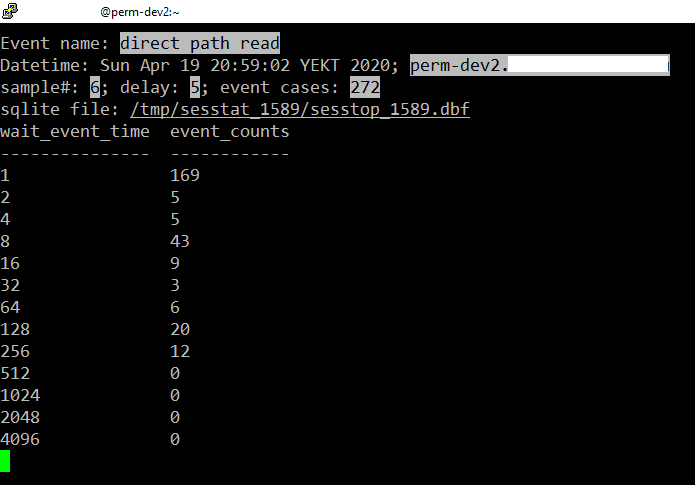This script provides dynamic report about top-N sql-sessions, in sense of one, setted for the script, database-statistic. This script is intended to be used with oracle-database. It's cli-utility, bash script, which works like top-utility, but with data about oracle sql-session;
Usage:
sesstop [options]
Options:
-l --list [class] show list of statistics in class
-f --find [name] find statistic with name
-i --id <stat id> run top on stat id number with default parameters (10 elements and 20 seconds delay)
-d --delay [number] delay information update delay [default 20 sec]
-t --top-size display number of top elements [default 10]
-h --help display this help and exit
-n --nodeletedb Do not delete sqlitedb after script ending; By default: it'll be erased;
Statistics classes:
1. User
2. Redo
3. Enqueue
4. Cache
5. OS
6. Real Application Clusters
7. SQL
8. Debug
As a prerequirements: sqlite should be installed and be available. Current version of the script was developed with sqlite 3.3.6; You have to write full path to sqlite-binary and database-file to bash-variables SQLITE, SQLITE_DB inside the script; Or you can provide the script with that information (and make some other settings) through conf-file, which have to be placed at the same directory and named as sesstop.conf For instance:
CONF_FILE="sesstop.conf"
cat << __EOF__ > "$CONF_FILE"
TMP_DIR="/tmp/sesstat_$$"
TMP_FILE="/tmp/sesstat_$$/temp.dat"
SQLITE="/usr/bin/sqlite3"
SQLITE_DB="/tmp/sesstat_$$/sesstop_$$.dbf"
DELAY="5"
TOP_SIZE="15"
__EOF__
./sesstop.sh -i 12Script's concept and sql-queries was offered by Maksim Ivanov (MaksimIvanovPerm )
Some code and parameters options processing was developed by Denis Vodopyanov (dvodop )
Thanks for the mentoring and support Maksim Ivanov and Denis Vodopyanov.
This script provides dynamic report about disrtibution of duration of cases of given event; It uses sys.v_$event_histogram as data-source; It pulls data about event, which you set, from there, waits for setted period of time and pulls new data about the same event again, from the oracle-view; Then it finds out delta-values, between those two samples of data and shows it; So you're able to see: how many cases of setted event happened and distribution of duration of those cases;
Usage:
event_hist.sh [options]
Options:
-f --find [name] find id of interesting event;
Optionally you're able to set name, or part of name of event to find;
-i --id <event id> run top on given event-id with default parameters (10 elements and 20 seconds delay)
-d --delay [number] delay information update delay [default 20 sec]
-t --top-size display number of top elements [default 10]
-h --help display this help and exit
-n --nodeletedb Do not delete sqlitedb after script ending; By default: it'll be erased;
example:

